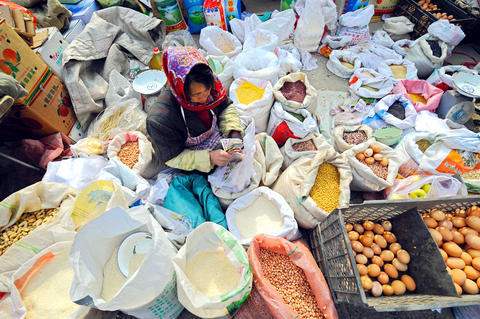The World Bank cut its economic growth forecast for China this year to 9.6 percent from 10.8 percent yesterday because of cooling global export demand and said storms battering southern China should have little long-term impact.
Growth should be buoyed by expected strong demand from China's own consumers, though a possible US slowdown might hurt the country's large export sector, the bank said in a quarterly report.
Economists have slashed forecasts for China's fast-growing economy amid worries that a US recession could cut US imports from China and hurt other Chinese markets such as Europe and Japan.

PHOTO: AFP
"The world economy is going to be weaker and this will have an impact on China," said Louis Kuijs, a bank economist who was the report's chief author.
Still, "China is in a relatively strong position," he said.
Growth of 9.6 percent was "still robust," Kuijs said.
Snowstorms that have wrecked crops and disrupted trains and trucking in southern China would hurt industrial output and push up prices of vegetables and other perishable goods, but there should be little long-term effect, the bank said. The government has reported storm damage so far at 53.8 billion yuan (US$7.5 billion).
"There is no doubt it is going to affect industrial production and economic activity in the short term," Kuijs said. "We do think, though, that most of this impact is going to be temporary."
The slowdown in global demand would hurt China's manufacturers and exporters, Kuijs said. The government said exports rose 25.7 percent last year to US$1.2 trillion.
But Chinese consumer spending and corporate profits are "still strong" and Beijing is moving ahead with investment plans that should help to shore up growth, Kuijs said.
The bank warned that China still faces potential problems as it tries to manage rapid growth, control a surge in inflation and cope with a flood of export revenues that are straining the central bank's ability to contain pressure for prices to rise.
Inflation so far is limited to food, but if it continues, "the risk remains that it will be fed through into general inflation," Kuijs said.
The central bank has raised interest rates repeatedly over the past year and Kuijs said regulators were right to focus on such a "relatively tight" monetary stance.
Beijing has responded to the surge in food costs by imposing price controls and trying to increase supplies by boosting subsidies to pig farmers and curbing grain exports.
David Dollar, director of the World Bank's Beijing office, said such controls could help in the short run. But he echoed warnings by other economists who say they could hurt the economy by eliminating incentives to expand output.
If pork or grain prices are set below what it costs farmers to produce them, "then you are discouraging production of exactly what is in short supply," he said.

A Chinese freighter that allegedly snapped an undersea cable linking Taiwan proper to Penghu County is suspected of being owned by a Chinese state-run company and had docked at the ports of Kaohsiung and Keelung for three months using different names. On Tuesday last week, the Togo-flagged freighter Hong Tai 58 (宏泰58號) and its Chinese crew were detained after the Taipei-Penghu No. 3 submarine cable was severed. When the Coast Guard Administration (CGA) first attempted to detain the ship on grounds of possible sabotage, its crew said the ship’s name was Hong Tai 168, although the Automatic Identification System (AIS)

An Akizuki-class destroyer last month made the first-ever solo transit of a Japan Maritime Self-Defense Force ship through the Taiwan Strait, Japanese government officials with knowledge of the matter said yesterday. The JS Akizuki carried out a north-to-south transit through the Taiwan Strait on Feb. 5 as it sailed to the South China Sea to participate in a joint exercise with US, Australian and Philippine forces that day. The Japanese destroyer JS Sazanami in September last year made the Japan Maritime Self-Defense Force’s first-ever transit through the Taiwan Strait, but it was joined by vessels from New Zealand and Australia,

SECURITY: The purpose for giving Hong Kong and Macau residents more lenient paths to permanent residency no longer applies due to China’s policies, a source said The government is considering removing an optional path to citizenship for residents from Hong Kong and Macau, and lengthening the terms for permanent residence eligibility, a source said yesterday. In a bid to prevent the Chinese Communist Party (CCP) from infiltrating Taiwan through immigration from Hong Kong and Macau, the government could amend immigration laws for residents of the territories who currently receive preferential treatment, an official familiar with the matter speaking on condition of anonymity said. The move was part of “national security-related legislative reform,” they added. Under the amendments, arrivals from the Chinese territories would have to reside in Taiwan for

CRITICAL MOVE: TSMC’s plan to invest another US$100 billion in US chipmaking would boost Taiwan’s competitive edge in the global market, the premier said The government would ensure that the most advanced chipmaking technology stays in Taiwan while assisting Taiwan Semiconductor Manufacturing Co (TSMC, 台積電) in investing overseas, the Presidential Office said yesterday. The statement follows a joint announcement by the world’s largest contract chipmaker and US President Donald Trump on Monday that TSMC would invest an additional US$100 billion over the next four years to expand its semiconductor manufacturing operations in the US, which would include construction of three new chip fabrication plants, two advanced packaging facilities, and a research and development center. The government knew about the deal in advance and would assist, Presidential